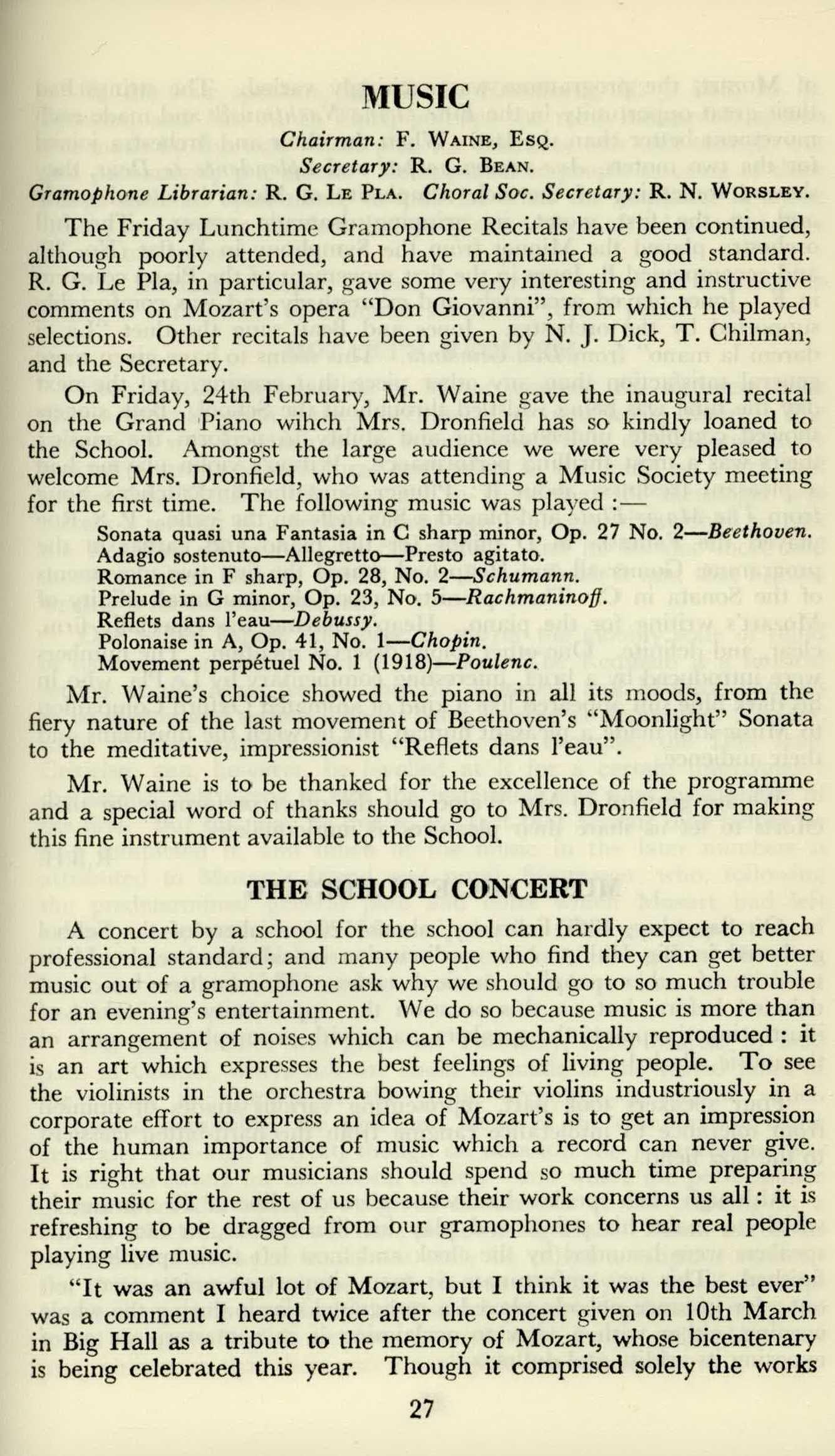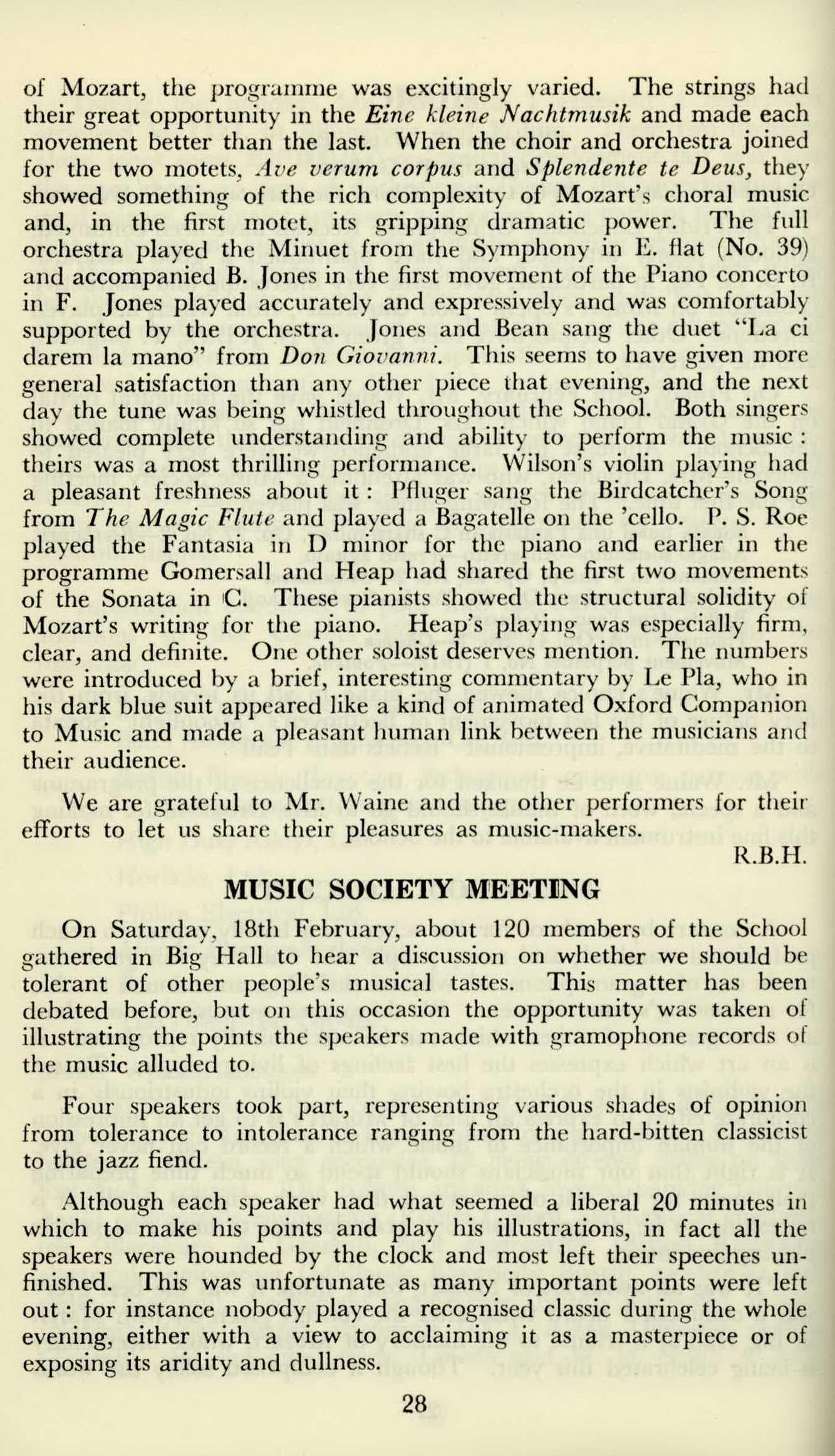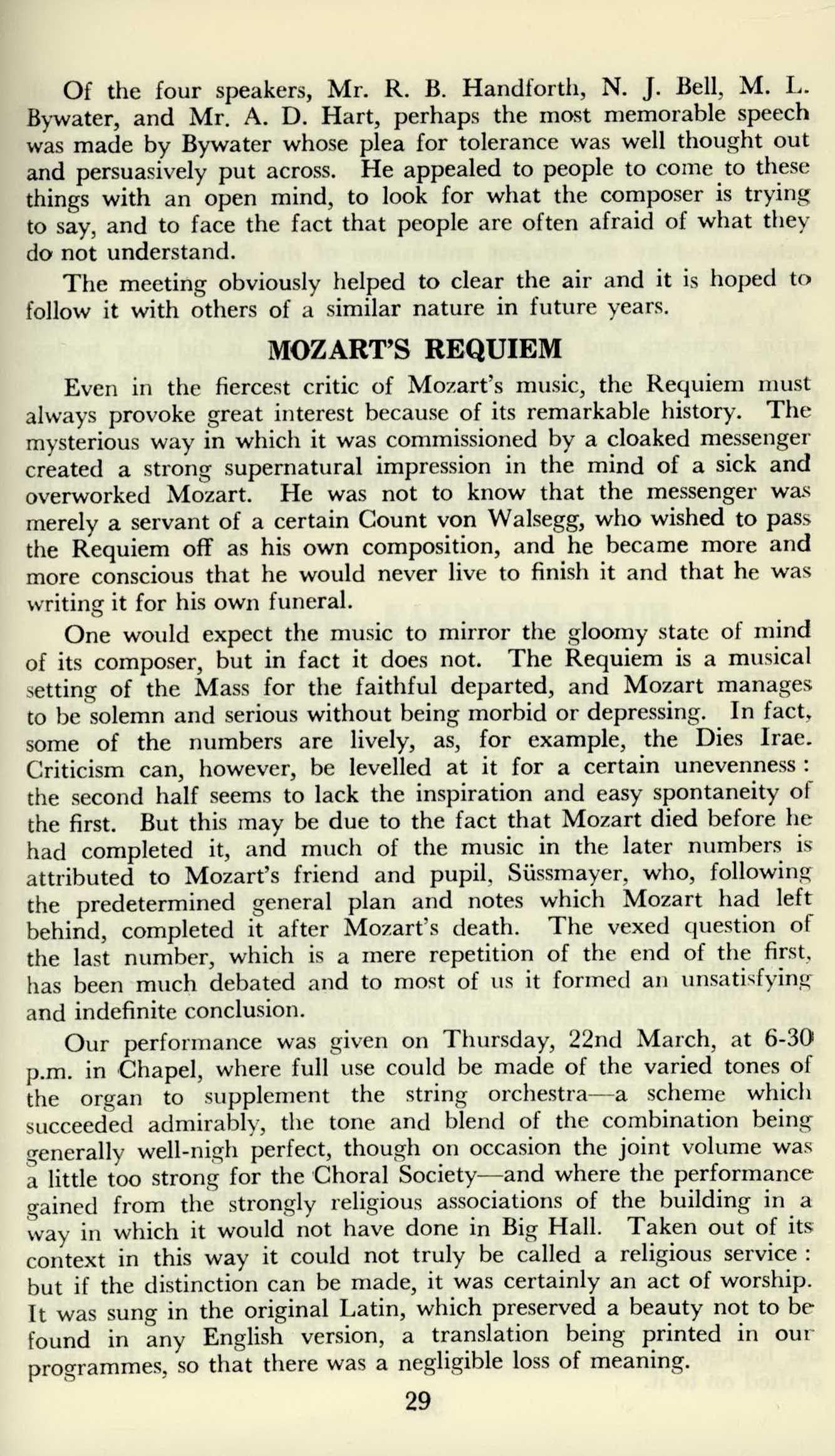
7 minute read
Music
from May 1956
by StPetersYork
Chairman: F. WAINE, ESQ. Secretary: R. G. BEAN. Gramophone Librarian: R. G. LE PLA. Choral Soc. Secretary: R. N. WORSLEY.
The Friday Lunchtime Gramophone Recitals have been continued, although poorly attended, and have maintained a good standard. R. G. Le Pla, in particular, gave some very interesting and instructive comments on Mozart's opera "Don Giovanni", from which he played selections. Other recitals have been given by N. J. Dick, T. Chilman, and the Secretary.
On Friday, 24th February, Mr. Waine gave the inaugural recital on the Grand Piano wihch Mrs. Dronfield has so kindly loaned to the School. Amongst the large audience we were very pleased to welcome Mrs. Dronfield, who was attending a Music Society meeting for the first time. The following music was played :-
Sonata quasi una Fantasia in C sharp minor, Op. 27 No. 2—Beethoven. Adagio sostenuto—Allegretto--Presto agitato. Romance in F sharp, Op. 28, No. 2—Schumann. Prelude in G minor, Op. 23, No. 5—Rachmaninoff . Reflets dans l'eau—Debussy. Polonaise in A, Op. 41, No. 1—Chopin. Movement perpetuel No. 1 (1918)—Poulenc.
Mr. Waine's choice showed the piano in all its moods, from the fiery nature of the last movement of Beethoven's "Moonlight" Sonata to the meditative, impressionist "Reflets dans l'eau".
Mr. Waine is to be thanked for the excellence of the programme and a special word of thanks should go to Mrs. Dronfield for making this fine instrument available to the School.
THE SCHOOL CONCERT
A concert by a school for the school can hardly expect to reach professional standard; and many people who find they can get better music out of a gramophone ask why we should go to so much trouble for an evening's entertainment. We do so because music is more than an arrangement of noises which can be mechanically reproduced : it is an art which expresses the best feelings of living people. To see the violinists in the orchestra bowing their violins industriously in a corporate effort to express an idea of Mozart's is to get an impression of the human importance of music which a record can never give. It is right that our musicians should spend so much time preparing their music for the rest of us because their work concerns us all : it is refreshing to be dragged from our gramophones to hear real people playing live music. "It was an awful lot of Mozart, but I think it was the best ever" was a comment I heard twice after the concert given on 10th March in Big Hall as a tribute to the memory of Mozart, whose bicentenary is being celebrated this year. Though it comprised solely the works 27
of Mozart, the programme was excitingly varied. The strings had their great opportunity in the Eine kleine Nachtmusik and made each movement better than the last. When the choir and orchestra joined for the two motets, Ave serum corpus and Splendente to Deus, they showed something of the rich complexity of Mozart's choral music and, in the first motet, its gripping dramatic power. The full orchestra played the Minuet from the Symphony in E. flat (No. 39) and accompanied B. Jones in the first movement of the Piano concerto in F. Jones played accurately and expressively and was comfortably supported by the orchestra. Jones and Bean sang the duet "La ci darem la mano" from Don Giovanni. This seems to have given more general satisfaction than any other piece that evening, and the next day the tune was being whistled throughout the School. Both singers showed complete understanding and ability to perform the music : theirs was a most thrilling performance. Wilson's violin playing had a pleasant freshness about it : Huger sang the Birdcatcher's Song from The Magic Flute and played a Bagatelle on the 'cello. P. S. Roe played the Fantasia in D minor for the piano and earlier in the programme Gomersall and Heap had shared the first two movements of the Sonata in C. These pianists showed the structural solidity of Mozart's writing for the piano. Heap's playing was especially firm, clear, and definite. One other soloist deserves mention. The numbers were introduced by a brief, interesting commentary by Le Pla, who in his dark blue suit appeared like a kind of animated Oxford Companion to Music and made a pleasant human link between the musicians and their audience.
We are grateful to Mr. Waine and the other performers for their efforts to let us share their pleasures as music-makers.

R.B.H.
MUSIC SOCIETY MEETING
On Saturday, 18th February, about 120 members of the School gathered in Big Hall to hear a discussion on whether we should be tolerant of other people's musical tastes. This matter has been debated before, but on this occasion the opportunity was taken of illustrating the points the speakers made with gramophone records of the music alluded to.
Four speakers took part, representing various shades of opinion from tolerance to intolerance ranging from the hard-bitten classicist to the jazz fiend.
Although each speaker had what seemed a liberal 20 minutes in which to make his points and play his illustrations, in fact all the speakers were hounded by the clock and most left their speeches unfinished. This was unfortunate as many important points were left out : for instance nobody played a recognised classic during the whole evening, either with a view to acclaiming it as a masterpiece or of exposing its aridity and dullness.
Of the four speakers, Mr. R. B. Handforth, N. J. Bell, M. L. Bywater, and Mr. A. D. Hart, perhaps the most memorable speech was made by Bywater whose plea for tolerance was well thought out and persuasively put across. He appealed to people to come to these things with an open mind, to look for what the composer is trying to say, and to face the fact that people are often afraid of what they do not understand.
The meeting obviously helped to clear the air and it is hoped to follow it with others of a similar nature in future years.
MOZART'S REQUIEM
Even in the fiercest critic of Mozart's music, the Requiem must always provoke great interest because of its remarkable history. The mysterious way in which it was commissioned by a cloaked messenger created a strong supernatural impression in the mind of a sick and overworked Mozart. He was not to know that the messenger was merely a servant of a certain Count von Walsegg, who wished to pass the Requiem off as his own composition, and he became more and more conscious that he would never live to finish it and that he was writing it for his own funeral.
One would expect the music to mirror the gloomy state of mind of its composer, but in fact it does not. The Requiem is a musical setting of the Mass for the faithful departed, and Mozart manages to be solemn and serious without being morbid or depressing. In fact, some of the numbers are lively, as, for example, the Dies Irae. Criticism can, however, be levelled at it for a certain unevenness : the second half seems to lack the inspiration and easy spontaneity of the first. But this may be due to the fact that Mozart died before he had completed it, and much of the music in the later numbers is attributed to Mozart's friend and pupil, Siissmayer, who, following the predetermined general plan and notes which Mozart had left behind, completed it after Mozart's death. The vexed question of the last number, which is a mere repetition of the end of the first, has been much debated and to most of us it formed an unsatisfying and indefinite conclusion.
Our performance was given on Thursday, 22nd March, at 6-30 p.m. in Chapel, where full use could be made of the varied tones of the organ to supplement the string orchestra—a scheme which succeeded admirably, the tone and blend of the combination being generally well-nigh perfect, though on occasion the joint volume was a little too strong for the Choral Society—and where the performance gained from the strongly religious associations of the building in a way in which it would not have done in Big Hall. Taken out of its context in this way it could not truly be called a religious service : but if the distinction can be made, it was certainly an act of worship. It was sung in the original Latin, which preserved a beauty not to be found in any English version, a translation being printed in our programmes, so that there was a negligible loss of meaning.
29











